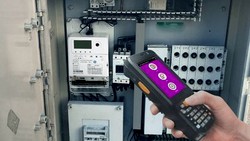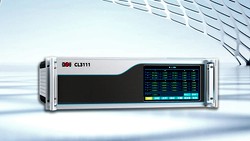Let's be honest, —everyone's had that one ex who was technically "functional," but left you questioning your life choices. Maybe they were occasionally reliable, but their communication skills lagged behind a dial-up modem, their dependability rivalled a 1998 Ford Fiesta, and their idea of "adapting" was remembering your birthday—after three reminders.
Now, imagine your energy infrastructure acting the same way.
Unpredictable billing?
✅ Check.
No real-time feedback?
✅ Check.
A complete lack of transparency until something goes catastrophically wrong?
✅ ✅ Double check.
Luckily, smart meters—working together with a smart AMI system—are here to save the day. Unlike your ex, this combo actually communicates, adapts, and gets smarter over time. They don't ghost you, gaslight you about your power bill, or leave you in the dark (literally or metaphorically). And best of all? They're certified by international standards, so you know you're getting the real deal.
Let's break down why smart meters are the upgrade your utility—and your sanity—deserves.
They Actually Communicate (Unlike Some People We Know)
The Ex Problem: Radio Silence Until It's Too Late
Remember when your ex would disappear for days, only to reappear with a vague "We need to talk" text? Meanwhile, you're left piecing together what went wrong from cryptic hints and half-remembered conversations.
Traditional meters operate on a similar principle. They sit there, silently spinning (or not spinning, if you're lucky), and the only time you hear from them is when the bill arrives—often with a number so shocking you wonder if you've been secretly powering a Bitcoin mine.
The Smart Meter Solution: Real-Time, Two-Way Communication
Smart meters are the texting-back-immediately, no-games partner of the energy world. They provide:
- Real-time data—No more waiting a month to find out you left the AC on all week.
- Two-way communication—They send and receive data, enabling demand response, remote disconnects, and firmware updates (unlike your ex, who never improved with time).
- Proactive alerts—If there's an outage, a spike in usage, or a potential issue, you'll know before it becomes a crisis.
All this happens using secure, standardized protocols like IEC 62056 (DLMS/COSEM) or ANSI C12.22, so your data's not just fast, it's interoperable and safe from nosy neighbours—or exes.
Example: Utilities like ERCOT (Texas) report outage detection times reduced by 80-95%., simply because smart meters instantly reported faults instead of waiting for a customer call. Meanwhile, your ex still takes three days to reply to "Did you feed the cat?"
They're Consistent (No More "It's Not You, It's Me" Excuses)
The Ex Problem: Unpredictable Behaviour
One day, your ex is all about "Netflix and chill." The next, they're "not in the right headspace" and need to "find themselves" (preferably in a different time zone). Their mood swings make a bipolar voltage regulator look stable.
Traditional meters have their own version of this:
- Estimated bills when they can't get a manual read (because sending someone to check the meter is so 2005).
- Missed usage spikes—like that time your teenager turned the house into a sauna in January.
- Silent failures—no warning, just a sudden "surprise" when the bill arrives or the power cuts out.
The Smart Meter Solution: Precision You Can Rely On
Smart meters are the steady, dependable partner you wish you'd had. They:
- Measure consumption in real time—no more "estimated" bills based on guesswork.
- Detect anomalies—like a fridge running 24/7 or a faulty HVAC before it becomes expensive.
- Provide granular data—hourly, daily, or monthly breakdowns so you can see exactly where energy is being used (or wasted).
And unlike your ex's memory, smart meters must meet accuracy requirements set by e.g. IEC 62053-21 or ANSI C12.20, so you get reliable readings every time.
Example: U.S. DOE studies show up to 90% fewer billing errors in AMI deployments. Meanwhile, your ex still can't remember if they borrowed €20 or €200.
They Adapt to Your Needs (Unlike Someone Who Thinks "Compromise" Means You Do All the Work)
The Ex Problem: One-Sided Effort
You wanted to split chores 50/50. Your ex interpreted that as "I'll do the dishes once and you handle everything else forever." You suggested couples therapy; they suggested "just not fighting as much" (while continuing to do all the things that start fights).
Traditional grids are just as rigid. Peak demand? Too bad—here's a higher bill. Outage? Hope you like candles. Want to use renewables? Good luck tracking it without a PhD in spreadsheet analysis.
The Smart Meter Solution: Dynamic, User-Centric Energy Management
Smart meters don't just measure—they enable smarter energy use by:
- Supporting time-of-use (TOU) pricing—Shift usage to off-peak hours and save money.
- Integrating with home energy systems—Solar panels? Battery storage? EVs? Smart meters help optimize them all.
- Enabling demand response programmes—Utilities can incentivize reduced usage during peak times, preventing blackouts and lowering costs.
Compliance with standards like IEC 62056 or IEEE 2030.5 ensures your smart meter can play nicely with solar, storage, and grid automation—no drama, just seamless data flow.
Example: In Ontario, Canada, smart meters helped reduce peak demand by 6% through TOU pricing, saving consumers €1.5 billion over a decade. Meanwhile, your ex's idea of "saving money" was splitting a sandwich after already eating half.
They Help the Planet (Unlike Your Ex's Carbon Footprint from All That Drama)
The Ex Problem: Emotional (and Environmental) Waste
Between late-night taxi rides, impulsive online shopping, and the sheer energy wasted on arguments about recycling, your ex was basically a one-person climate disaster.
Traditional energy systems aren't much better. Without real-time data, utilities overgenerate power to meet worst-case demand, leading to:
- Wasted energy (like keeping a power plant running at full capacity "just in case").
- Higher emissions (because inefficient grids rely more on fossil fuels).
- No incentive for conservation (if customers don't see their usage, why change?).
The Smart Meter Solution: Sustainability Without the Guilt Trip
Smart meters make efficiency effortless by:
- Reducing energy waste—Better demand forecasting means utilities generate only what's needed.
- Encouraging renewable adoption—With real-time data, customers can track solar/battery performance and optimize usage.
- Lowering overall emissions—Smart grids, as outlined in IEC 61968 and IEC 61970, can cut CO₂ emissions by up to 20% through efficiency gains.
Example: IEA data indicates smart grids reduce CO₂ emissions by 5-15% on average. Meanwhile, your ex's old clunker is still idling in your driveway.
They're Low-Maintenance (No More "Fixing" Someone Else's Problems)
The Ex Problem: High Maintenance, Low Reward
You spent more time managing their insecurities than your own career. You became an unpaid therapist, personal chef, and taxi driver—all while they "weren't sure" if they were ready for a relationship.
Traditional meters? Also high-maintenance. They require:
- Manual reads (because nothing says "efficiency" like a clipboard).
- Physical inspections (hope you like climbing ladders in the rain).
- No remote troubleshooting (if there's an issue, someone's driving out to check).
The Smart Meter Solution: Set It and Forget It
Smart meters are the independent, self-sufficient partner you deserve:
- No manual reads—Data is transmitted automatically.
- Remote diagnostics—Issues can be identified and sometimes fixed without a truck roll.
- Long lifespan—Most smart meters last 15–20 years with minimal upkeep.
Remote firmware updates are handled securely, following protocols like IEC 62056-5-3, so your meter stays up to date—no awkward surprises.
Example: Remote diagnostics reduce site visits by 70% (per Duke Energy reports). Meanwhile, your ex still expects you to pay for "emergency" sushi runs.
The Takeaway: Smart Meters Are the Upgrade We All Need
At the end of the day, smart meters aren't just a technological improvement—they're a relationship upgrade. They:
✅ Communicate clearly (no passive-aggressive billing).
✅ Stay consistent (no "surprise" charges).
✅ Adapt to your needs (not the other way around).
✅ Help the planet (without the performative social media posts).
✅ Require minimal effort (unlike that one ex who turned "low-maintenance" into an Olympic sport).
And remember, all this is backed by international standards—so you're not just getting a smarter meter, you're getting one that's certified to play fair.
While your ex may still be out there, probably telling people they were the one who broke up with you, smart meters are quietly improving the energy sector—one accurate kilowatt-hour at a time.
So, to all the engineers, utility workers, and energy professionals reading this: choose the smart meter. It's the stable, data-driven, emotionally intelligent partner your grid deserves.
And if anyone asks why you're smiling while reading this? Just say you finally found something smarter than your ex.
Ready to Break Up With Outdated Tech?
If you're tired of unreliable relationships—with your energy infrastructure, that is—it's time to upgrade. At CLOU, we don't just talk a good game; we deliver certified smart meters and AMI solutions that communicate, adapt, and make your grid life drama-free.
Curious how our technology can help your utility, city, or project? Want to see real-world results or get a personalised consultation?
Reach out to our team for more information, a product demo, or a friendly chat about how CLOU's smart metering solutions can transform your operations.
Don't settle for less—choose the partner that's got your back (and your data).
Contact us today and discover why smart meters are smarter than your ex—guaranteed.
Get in touch Contact Us with CLOU's experts now.
Contact Us with CLOU's experts now.







All comments are moderated before being published. Inappropriate or off-topic comments may not be approved.